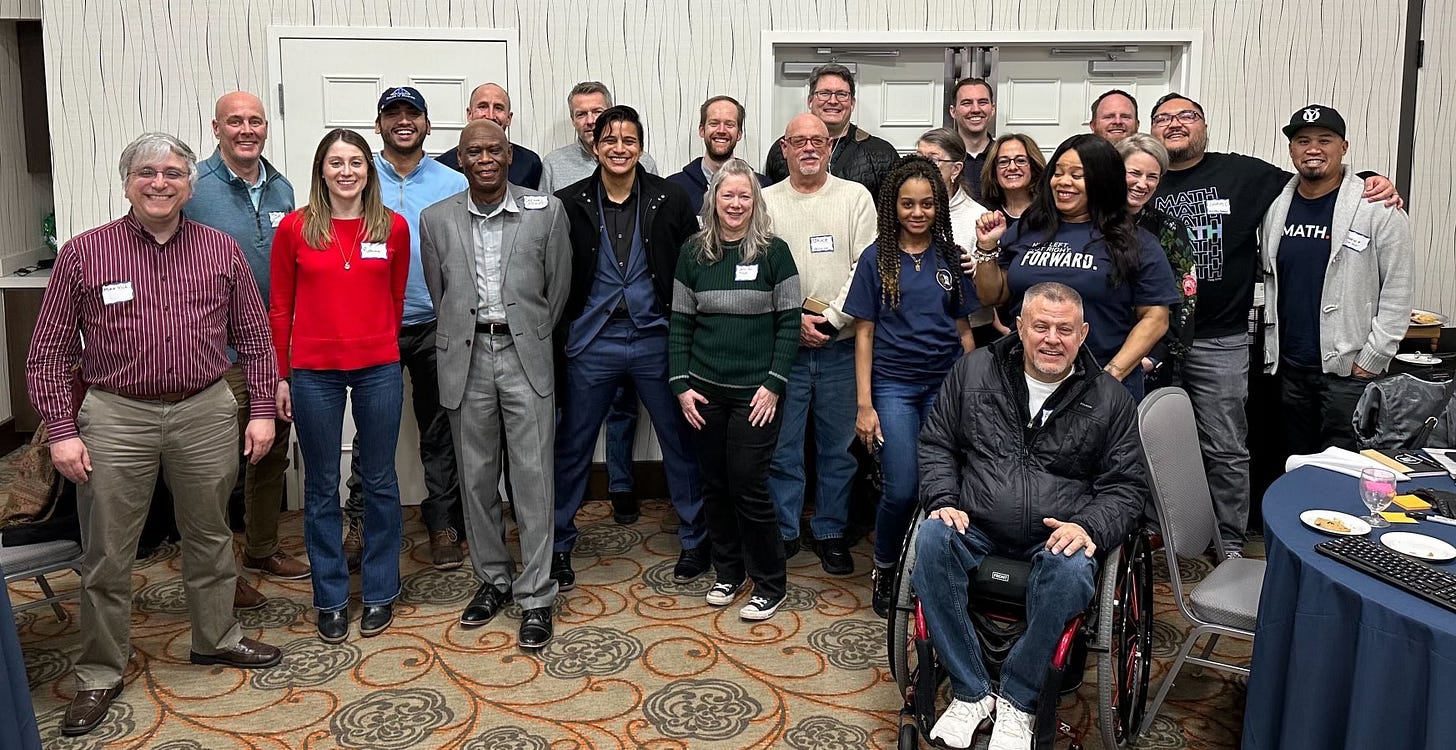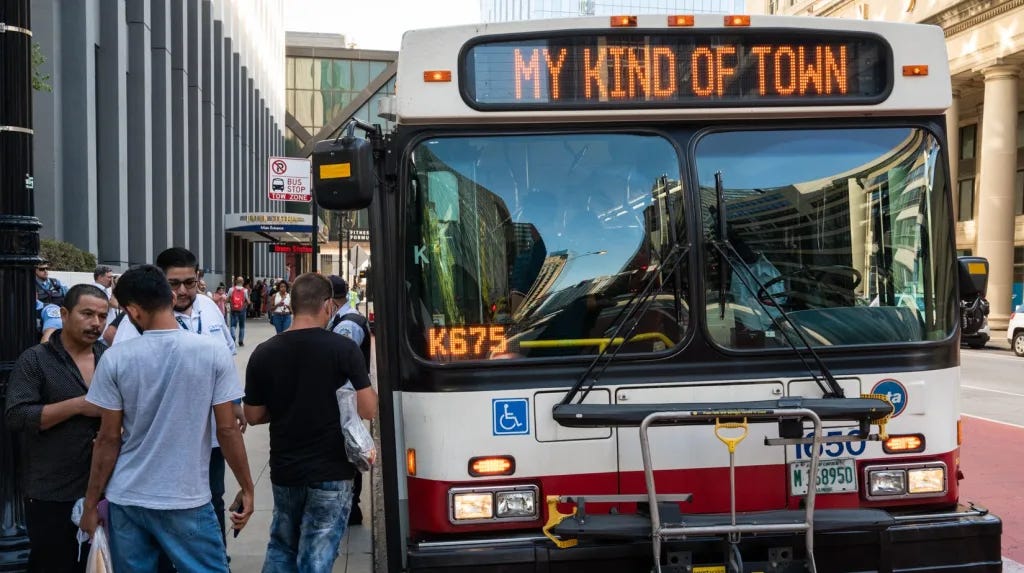A better way forward? A new political party takes shape in Illinois
As another bruising “non-partisan” electoral campaign heads into the final stretch in Chicago, a group of independent activists meet to chart a new path.
With a large field of candidates running for mayor in Chicago and an election almost certain to end in a runoff, at least one city alderman has proposed what he calls a better way forward: ranked choice voting.
Forward Party Illinois activists meet Feb. 9. Pictured at left is Civic Update editor Mike Vick.
Ald. Matt Martin (47th) introduced a resolution to the City Council last week calling for a hearing to discuss moving to the alternative voting method, which involves ranking candidates on the ballot.
If no candidate reaches the 50-percent-plus-one-vote threshold, the candidate with the fewest first place votes gets eliminated, and his or her voters transfer their votes to the candidate they ranked in second place. The process continues until one candidate gets over the threshold.
The voting method is also termed Instant Runoff Voting because instead of the costly and time-consuming process of running a second runoff election, the runoff election happens automatically in the tally process.
Voters have adopted RCV in many cities around the country, including New York, San Francisco and even Evanston, Illinois. Meanwhile, Fargo, North Dakota and St. Louis, Missouri, have both adopted another alternative voting system called approval voting, and a group based largely in Oregon has tried – so far unsuccessfully – to implement yet another type of voting reform called STAR voting.
These voting reforms have joined other democracy reform movements, like independent redistricting efforts to end gerrymandering, work to move from the Electoral College to a national popular vote for president, and fights to end the corrosive effects of money in politics.
As regular readers of The Civic Update know, I am an advocate for such independent, grassroots, voter-led initiatives. I’ve taken that advocacy to the next level, leaving my former political home in the Democratic Party and joining an independent party, the Solidarity Party, that supports electoral reform and better fits a faith-formed political outlook. I’ve encouraged you as readers who likely also feel politically homeless to consider a similar move.
In that vein, today I spent all day at a conference with advocates for electoral reform, in this case advocates for the Forward Party. For those of you who have followed Pastor Chris Butler on Twitter, you may have seen that Pastor Chris met with Forward’s founder Andrew Yang late last year.
In addition to being fellow supporters of electoral reform efforts, both Pastor Chris and Andrew Yang support efforts to rebalance and democratize our economy through a basic income guarantee, a plan we pushed heavily during the congressional campaign last year, notably in an op-ed Pastor Chris wrote in the Chicago Tribune.
I’ve come out of this meeting with Forwardists in Illinois even more energized, and with a renewed belief that we’re on the precipice of something special. The activists in the room today were serious, intelligent, committed people, and I’m overjoyed that our democracy has them in its corner.
We don’t all agree on every issue. We had a wide range of political backgrounds and views on various issues. For that reason, I will continue the work I’m doing in the Solidarity Party, which represents a better fit for me politically and takes stands on issues I care about that go beyond the scope of the electoral reform work on which Forward is focused.
But we stand shoulder to shoulder regarding the need for long-overdue electoral reforms that are standing in the way of getting anything done about the many issues we hold dear.
Our system isn’t broken. It’s fixed – as in rigged. It’s working precisely as it’s designed, to favor the politically powerful and the economically advantaged.
We need to unrig this system. We can’t do it alone. Whatever your political background or affiliation, I hope you’ll join this needed work.
The Round Up
Here are the stories that caught our eyes this week and what they mean for the weeks ahead.
Homelessness in Chicago has become an even bigger problem than it was before the pandemic, leading more unhoused people to seek shelter in public spaces, according to advocates and experts.
Haymarket Center’s O’Hare outreach program has referred people staying at the airport to substance abuse counseling, housing and other social services since 1990. The group served 25 percent more people in 2022 than in the previous year, and that increased need has continued into 2023.
The nonprofit, funded by the Chicago Department of Aviation and the Department of Family Support Services, is open all day, every day, but has no sleeping capacity. It’s seeking additional funding options to meet the need and pairing with local agencies and other groups to address the issue.
Applications open for $500 payments to help domestic workers, undocumented immigrants in Chicago
Chicago’s Department of Family and Support Services is taking applications for the Chicago Resiliency Fund 2.0, which will distribute one-time $500 payments to 17,000 residents who identify as domestic workers and undocumented immigrants.
The payments are part of the federal funds the city received from the American Rescue Plan Act aimed at helping residents during the coronavirus pandemic.
To be eligible, residents must be 18 years or older, live in Chicago and have a total household income at or below 300 percent of the federal poverty level.
Participants of the Deferred Action for Childhood Arrivals program and immigrants who recently arrived within the past couple of months to seek asylum aren’t eligible for the funds, according to city officials.
Chicago rents are still high, for now
Rent is still getting pricier in Chicago, but renters are faring better here than in much of the U.S.
In the fourth quarter of 2022, the average asking rent in Chicago was $1,830, up 8.2 percent from a year earlier, per economic research firm Moody's Analytics. Still, that percentage is lower than the national average.
Affordability concerns are starting to weigh down the booming rental market. Many would-be homebuyers chose to rent longer last year, sustaining apartment demand, economists at Moody's Analytics say. But folks are hitting their spending limit.
Newsclips
Chicago gas stations, markets, banks would need armed guard under bill
Chicago alderman calls out Cardinal Blase Cupich over opposition to proposed city ordinance
It’s ‘Lights, camera, South Side,’ as ground breaks on South Shore film studio
Supt. David Brown likely to leave Chicago Police Department
Brendan Deenihan, chief of CPD’s detective division, is leaving the force, sources say
Mayoral race highlights
Chicago’s messy, caustic mayor’s contest has Democrats feuding over crime
Pension debt, property taxes, budget holes: Chicago’s next mayor faces huge financial problems
Poll: García, Vallas and Lightfoot in dead heat in Chicago mayor’s race
Five takeaways about voter turnout in Chicago ahead of this month’s municipal election
Paul Vallas focus of attacks at WBEZ/Sun-Times mayoral forum
Mayoral debate was a poor night for Chicago
Do you have ideas for future Civic Update stories or want to contribute a story yourself? Email our editor by clicking the button below!










